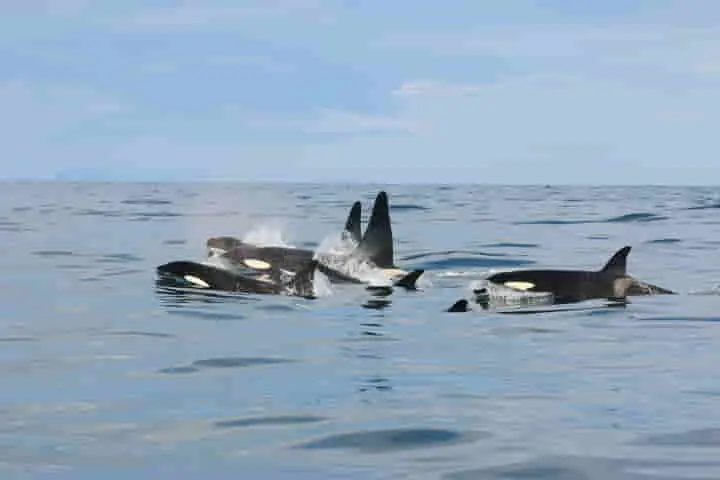

Scientists were surprised on seeing killer whales being chased by the pilot whales in Iceland (Pic. Courtesy Twitter/@uni_iceland)
<p>
<strong>It is rare to see top predators whether on land or water or air being driven off from their territory. When this occurs, the curiosity of the scientists is sparked and that is what transpired with Filipa Samarra, according to an article in smithsonianmag.com which was taken from Hakai Magazine.</strong></p>
<p>
It was in 2015 when Samarra and her research team were in southern Iceland waters eavesdropping on a group of killer whales. Listening to these creatures as they pipped, clicked and squealed, she heard high-pitched whistling.</p>
<p>
Samarra, who is a biologist and lead investigator of the Icelandic Orca Project recalled: &ldquo;Then the killer whales just went silent.&rdquo; With the whistling becoming louder, a group of pilot whales came into view, and seeing them the killer whales moved away.</p>
<p>
Speaking on this Anna Selbmann observed: <a href="https://www.smithsonianmag.com/science-nature/why-do-pilot-whales-chase-killer-whales-near-iceland-180978758/?utm_source=smithsoniandaily&amp;utm_medium=email&amp;utm_campaign=20210927-daily-responsive&amp;spMailingID=45687356&amp;spUserID=MTI4MDgxMTczNjcwMgS2&amp;spJobID=2084873467&amp;spReportId=MjA4NDg3MzQ2NwS2">&ldquo;It&rsquo;s quite unusual because the killer whale</a> is this top predator. It&rsquo;s very unusual that they&rsquo;re afraid of anything&mdash;or seemingly afraid.&rdquo; Selbmann is a doctoral candidate at the University of Iceland and she is supervised by Samarra.</p>
<p>
Documentation of exchanges between the pilot and killer whales have been done only a few times and what Samarra witnessed in Iceland was the first time a scientist had seen this behaviour. Following this, she had similar encounters nearly 20 more times.</p>
<p>
In the majority of the documentation around Iceland, Selbmann says it was found that killer whales seemed to avoid pilot whales. Some occasions saw the pilot whales chasing the killer whales at high speeds. Speaking on this aspect Samarra observed: &ldquo;One of the big questions that we have is understanding the variability. We don&rsquo;t really understand what are the contextual factors that drive their response being different sometimes.&rdquo;</p>
<p>
Based on earlier research two explanations are offered. According to one, there was competition between the two for prey. Stating that this may be possible, Selbmann says it is unlikely. The reason she offers is that while the Icelandic killer whales mostly eat herring, the pilot whales of the region mostly eat squids.</p>
<p>
About the other explanation, Selbmann explained: &ldquo;The other theory is that it&rsquo;s anti-predator mobbing behaviour. A lot of animals mob their predators to rob them of the element of surprise. For example, meerkats will throw sand at snakes.&rdquo; She added that this reasoning does not stand as considering that the killer whales aren&rsquo;t known to eat the smaller pilot whales. &ldquo;They&rsquo;re not really a threat to pilot whales,&rdquo; she remarked.</p>
<p>
<strong>Also read: </strong><a href="https://www.indianarrative.com/science-news/earless-worms-can-hear-and-fathom-sounds-117042.html"><strong>Earless Worms Can Hear And Fathom Sounds!</strong></a></p>
<p>
Offering another logic Selbmann stated that it&rsquo;s possible that the pilot whales didn&rsquo;t know that the killer whales weren&rsquo;t a threat. While the killer whales are known to eat other smaller whales like minkes, belugas, and narwhals, and at times larger baleen whales, it is possible that the pilot whales perceive them as a threat, and react appropriately.</p>
<p>
Marine mammal ecologist at the University of Manitoba Steve Ferguson, said the sightings were unusual since in other regions the killer whales are top predator and smaller creatures avoided them. Yet, there have been incidents when smaller prey creatures have attacked the killer whales. Now, scientists are looking at such cases more carefully and keenly and making a note of those creatures who are defending themselves and also becoming aggressive. They have already noted an unusual case of humpback whales defending other whales against attacks by killer whales.</p>
<p>
Making further studies, Selbmann and Samarra are conducting acoustic playback experiments. In Norway during earlier research, it was found that when the sound of killer whales was played to the pilot whales, the latter swam straight toward the sounds and flocked around the boat of the researchers. &ldquo;Now we want to test the reverse. Are the killer whales avoiding the pilot whale sounds?&rdquo; revealed Selbmann.</p>
<p>
The two broadcasted pilot whale recordings at killer whales equipped with tracking tags &ndash; four in number and till now they found that though the calls didn&rsquo;t scare them off immediately, some among the killer whales swam away. Samarra, however, feels closer analysis is necessary. &ldquo;It seems something has changed in this ecosystem,&rdquo; she said.</p>
<p>
<strong>Also read: </strong><a href="https://www.indianarrative.com/science-news/why-do-swarms-of-sardines-swim-to-their-death-in-the-warm-waters-of-the-indian-ocean-116817.html"><strong>Why do swarms of sardines swim to their death in the warm waters of the Indian Ocean?</strong></a></p>
Taiwan's Mainland Affairs Council (MAC) criticised China on Wednesday for organising two summits for Taiwanese…
The East Turkistan Government in Exile (ETGE) vehemently denounces Mr. Francesco Frangialli, the Honorary Secretary-General…
Chairman John Moolenaar and Ranking Member Raja Krishnamoorthi of the House Select Committee on the…
Representative Thinlay Chukki from the Tibet Bureau in Geneva spearheaded a delegation's trip to Frankfurt…
Prime Minister Narendra Modi will visit Sikkim, West Bengal, Bihar, and Uttar Pradesh on May…
US President Donald Trump claimed that he had offered Canada a choice between becoming the…